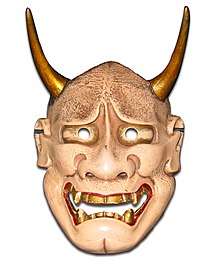
Hannya
Share
Hannya (般若) is a popular Japanese mask used in nō theater, representing a jealous female demon. The most popular drama in which the Hannya mask, featuring two large sharp horns, two glaring eyes, and a sneering mouth, was used is Dojoji, inspired by the famous story of Anchin and Kiyohime.
This mask is used to represent a woman who is so jealous that she has turned into a demon.
History

In Murasaki Shikibu's classic novel Genji Monogatari, the lady Aoi no Ue, official bride of Prince Genji, falls ill and dies because of the "living spirit" of a jealous rival, the lady Rokujo. This story is taken up in Zeami's nō drama "Aoi no Ue" (Princess Aoi) where the lead actor wears the Hannya mask to represent the "living spirit" of Rokujo.
Symbolism and curiosity
The Hannya mask is a classic of Japanese tattoos and as tradition dictates also in this case it was inspired by folk tales and legends. It is represented with a large head equipped with horns, two wide eyes that stare and scrutinize the viewer and the open mouth ready to devour or at best swallow whoever is in front.
"Han'nya" is a Sanskrit word that means "wisdom", "virtue" is the path that leads to enlightenment.
The meaning of this tattoo, however, is not strictly related to the legend, therefore to the figure of the woman turned into a demon as a result of blind jealousy and anger due to the betrayal of her lover, but it is said to "drive away evil spirits and bring good luck to people who wear them on their skin".

